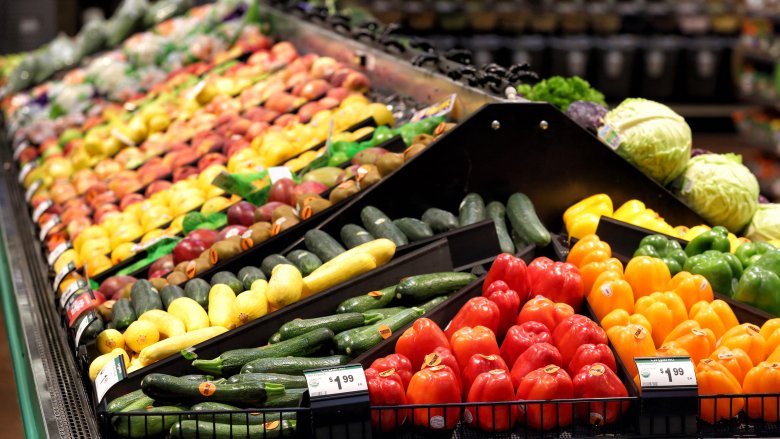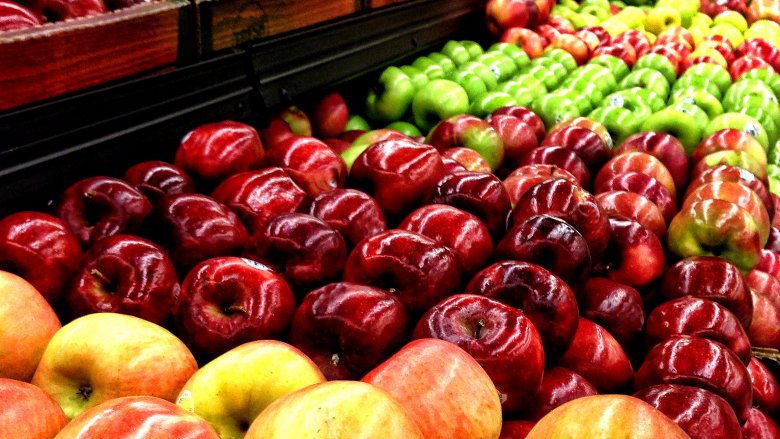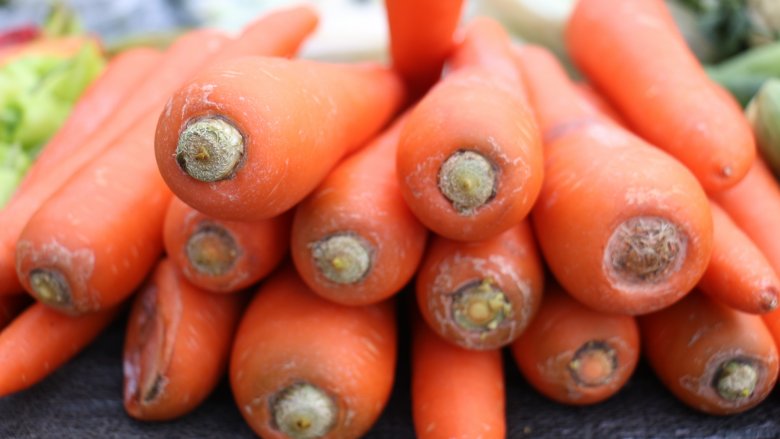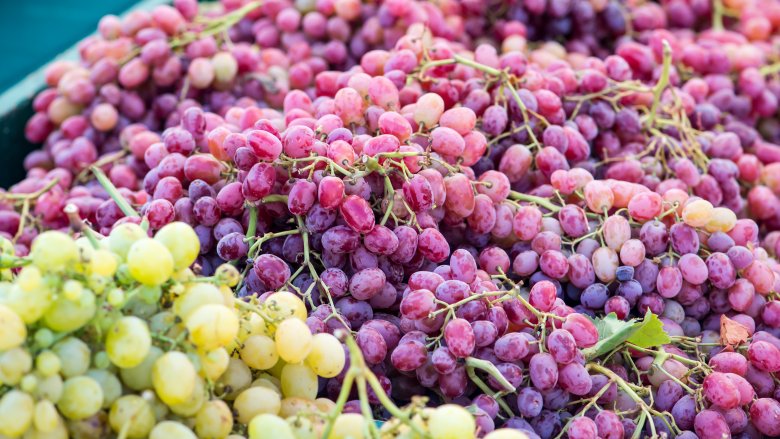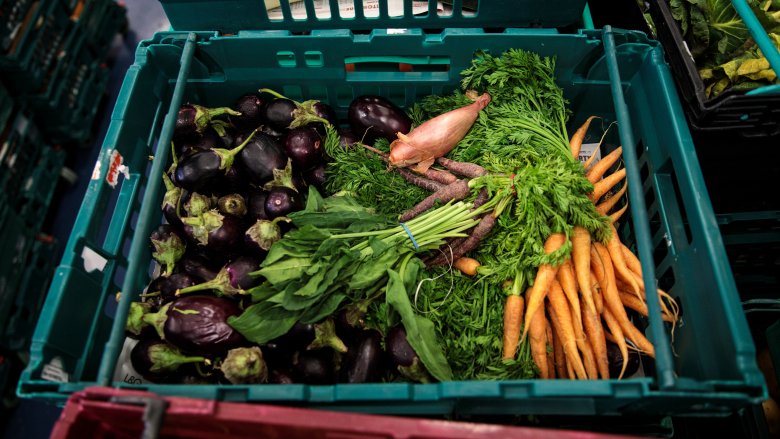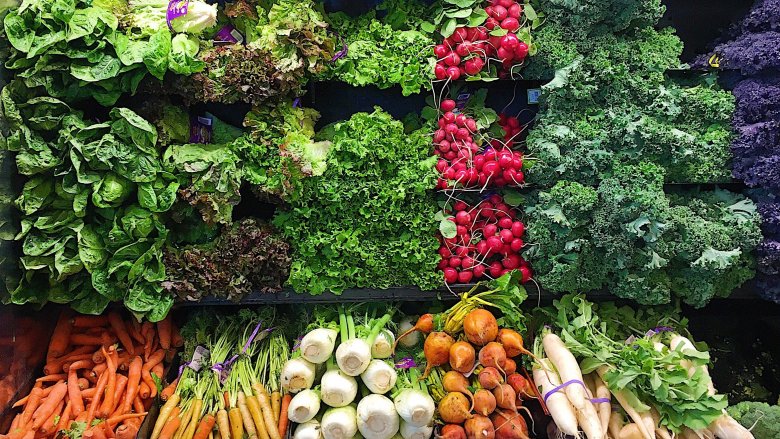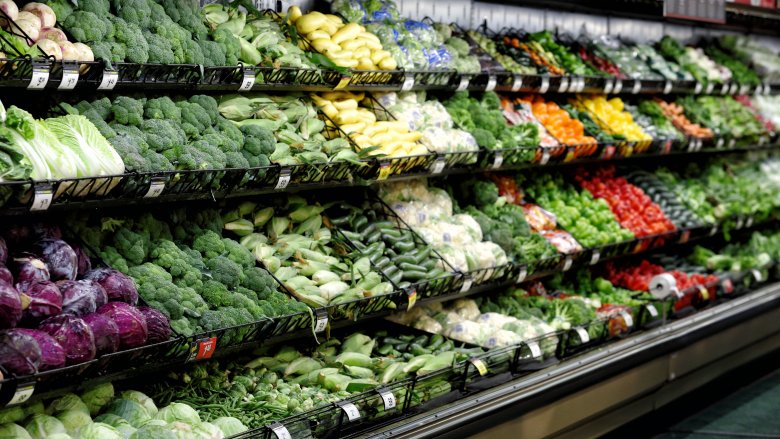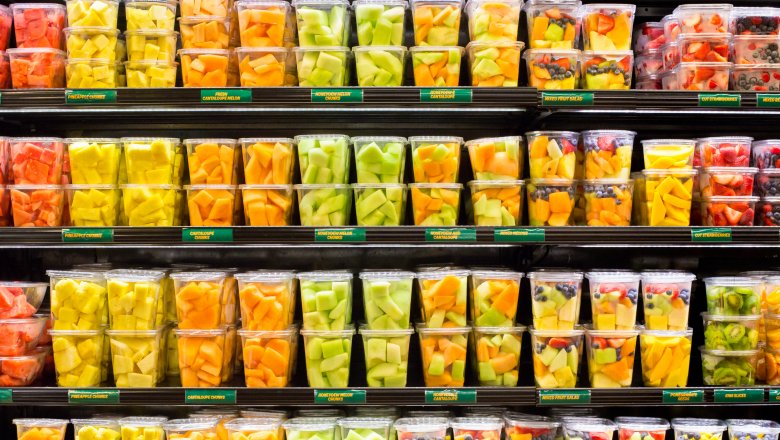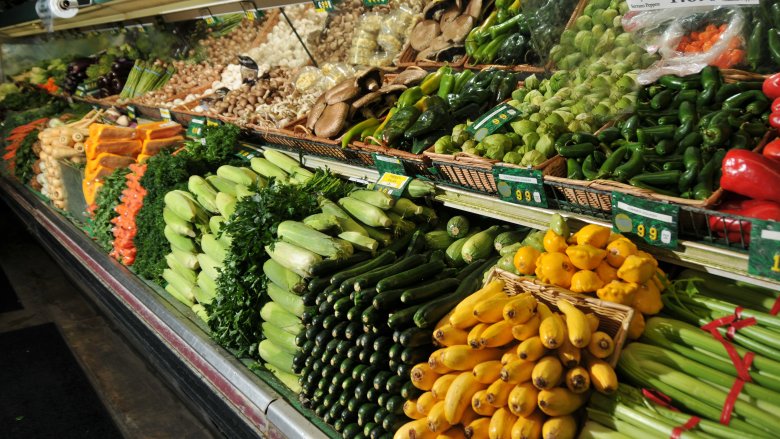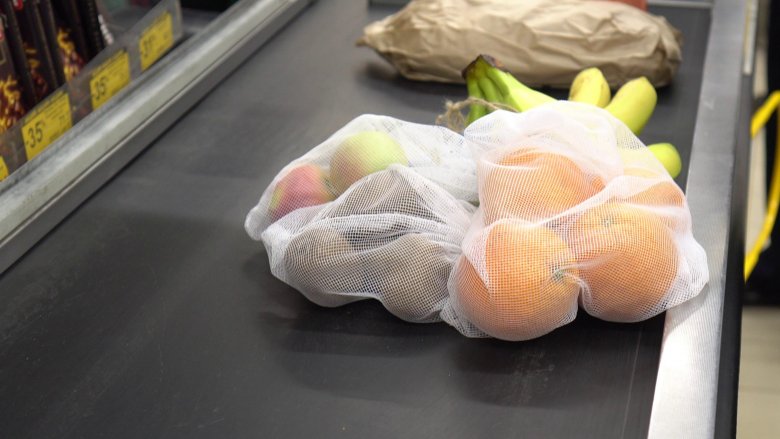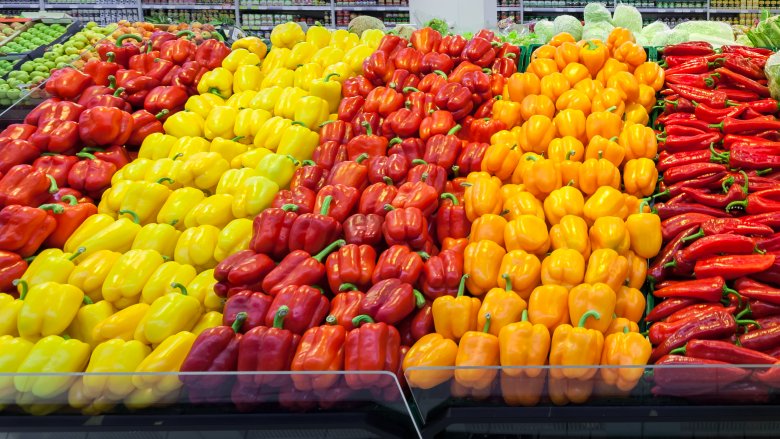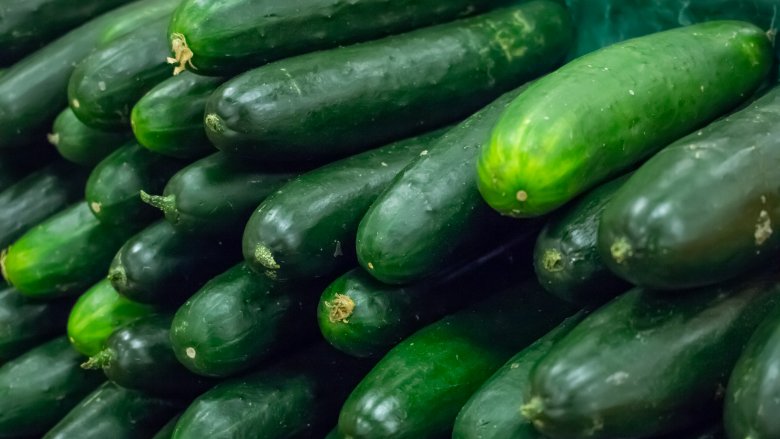The Disturbing Truth Of Your Grocery Store's Produce Department
Walk into most grocery stores and you're immediately pulled in by the dazzling display of stacked produce sitting front and center. Colorful peppers, shiny apples, walls of greens and fragrant herbs — all the fruits and veggies you need at your fingertips. In your mind's eye, you see the oh-so-attentive produce clerk tending to his babies (he obviously considers every lemon, lime, orange, and each bunch of chard his babies), making sure they're all properly cleaned, spritzed, and removing any bad apples (so to speak) from the bunch. The produce department is his happy place, and you know you can shop confidently because your produce is being treated right.
But what if it's not? What if there's a dark underbelly to your grocery store's produce department, where the produce is actually really dirty, might be full of spiders, is definitely not as fresh as you think it is, and where the clerks themselves admit to doing some pretty sketchy stuff when nobody is looking? How's that picture looking in your mind's eye now? Steel yourself for the disturbing secrets you're about to learn — the produce department might not be the Eden you thought it was.
The apples might be a year old
If you've ever gone apple picking, you know there's just something special about plucking the fruit straight from the tree and sinking your teeth into a fresh orb. Obviously, you know that the apples you buy at the supermarket aren't that fresh, but would you guess that you're filling up your fruit bowl with year-old apples? Shocking as that may sound, you might be.
Controlled atmosphere storage — what some farmers call "putting the apples to sleep" — is used to keep the fruit fresh until it's ready to be sold. By regulating the oxygen, carbon dioxide, and nitrogen levels, along with temperature and humidity, the apples can remain in storage for up to a year. Ken Nye of the Michigan Farm Bureau explained to USA Today, "It slows the respiration of the fruit and preserves it in a way that we can enjoy almost as if it just came out of the orchard. We've refined the process so you can enjoy apples year round. You can't look at it as an old apple." But what about the quality and flavor? Surely a year-old apple cannot be nearly as delicious as a fresh-picked one, can it? According to growers, there's "almost no loss of taste."
Any way you slice it, since apples are only harvested once a year in the U.S., chances are good that if you're buying them year-round, at some point you're biting into a several-month-old piece of fruit, minimum.
Other produce isn't as fresh as you think, either
If year-old apples give you the heebie-jeebies, you're not going to like what Mashable has to say about much of the other produce at your grocery store. It turns out that plenty of other fruits and vegetables spend a considerable amount of time in storage before they land at the supermarket.
Take lettuce, for instance. It might get washed in a solution of chlorine and preservatives before being put in cold storage for up to a month. Bananas can be manipulated to control ripening, and get cooled after being picked to stop the process. After two weeks, to kick-start the ripening process again, they're treated with ethylene gas. And tomatoes can be stored for up to six weeks in a low oxygen, high nitrogen environment — a far cry from the fresh-off-the-vine fruit you dream about.
Two, four, even six weeks doesn't seem like that long when you compare it to apple storage, though. But hold on — we haven't gotten to the carrots and potatoes. Just like apples, potatoes can be stored for up to a year in a temperature-controlled environment. As for carrots, well... they're stored in a zero degree, high humidity environment to prevent decay, and after nine months get a chlorine wash before making their way to your grocery store's produce department. Yum?
The grapes and bananas might be full of spiders
Spend any time on the internet, and you'll probably hear the hair-raising stories of those unfortunate souls who were just minding their own business, satisfying their hankering for some grapes or a banana, when out jumped a spider from the bunch. It might sound like a scene out of a horror movie, but it happens in real life more often than any of us would like to believe.
As scary as it might be though, the spiders aren't lying in wait, ready to inject us with venom and eventually take over the world. They're actually there doing an important job: Keeping the produce free of other pests who want to eat it. If the grapes, bananas, or other fruits and veggies you buy are free of pesticides, there's a good chance that spiders, otherwise known as biological pest control, will be present. "If spiders disappeared, we would face famine," arachnids expert Norman Platnick told The Washington Post. "Spiders are primary controllers of insects. Without spiders, all of our crops would be consumed by those pests."
While it might be common to find a spider lurking in your grapes, the chances of them being truly dangerous are slim. Even the black widows that have made appearances aren't too much cause for concern — according to Popular Science, though they are venomous, "the average adult doesn't have much to worry about" in the event of a black widow bite.
Old produce might end up in the deli salads
With the huge amount of fruits, vegetables, and herbs a grocery store keeps in stock on any given day, you'd have to assume that a fair amount of it goes to waste. After all, the window in which fresh produce is at its best is fleeting, and some tender greens start to wilt the moment they're picked. Don't despair, though — not all that waning produce ends up in the compost pile. According to Forbes, some of it ends up in the prepared deli soups and salads.
Yes, it's true. While you might not buy those wilted greens to make a salad for yourself, the grocery store has no qualms about using them in their own prepared salads to resell to customers. Never mind that the fruits and veggies might be considered unfit for sale — they're perfectly fine to be repurposed, apparently.
Dr. Ted Labuza, professor of food science at the University of Minnesota, explained, "Foods can remain safe to consume for some time beyond sell-by and even use-by dates provided they are handled and stored properly," and in the case of fresh produce, that just means it's been stored below 41 degrees Fahrenheit. Let's just hope they're not repurposing that slimy, bottom-of-the-tub spring mix.
You're probably buying the oldest produce
When it comes to canned and packaged foods on grocery store shelves, the oldest product gets rotated to the front of the shelf as the newer products get restocked. It makes sense — stores want to unload those foods that bear the earliest expiration date first, and those expiration dates are typically far enough out that it makes little difference to you as a shopper. But did you know that grocery stores also employ this method in the produce department?
That's according to one Redditor claiming to be a grocery store produce clerk, who explained, "A big deal with produce is FIFO, you've probably heard of this if you've worked with food before: first in, first out. So we rotate everything. If the people working produce locally are doing their job right the stuff you are buying is the oldest stuff we have."
While it might not matter that the can of condensed mushroom soup you just bought expires two months sooner than the can at the back of the shelf, you don't have that luxury with produce. In other words, avoid the head of broccoli on the top of the pile, since it's probably been there the longest. Go ahead, be that person and dig deep — the bottom of that broccoli pile is your best bet for the freshest head.
The constant misting might cost you
You have to admit that those produce department misters seem like a pretty good idea — the automated system means produce clerks don't have to spend their days spraying down the fruits and vegetables, and that faux thunder sound some of them make is a fun touch, too. But as great of an idea as they seem, those misters might be doing more harm than good — to both your pocketbook and the produce itself.
While it's true that the misters do an important job — keeping the produce from getting dehydrated — they can actually add too much water to the situation. When it comes to things like leafy greens or broccoli, for instance, where water can really get in between the leaves and into the nooks and crannies, it can add a lot of extra weight, and that extra weight translates to paying more per pound when it's weighed at checkout. It might sound inconsequential, but Taste of Home reports that it can result in a "25 percent hike in profits," so your best bet is to give things a little shake before you buy them.
One more downside is that all that extra water just sitting on and in the produce can lead to mold and rot, and according to Livestrong, has even been linked to Legionnaires' disease due to contaminated systems in rare cases.
Pre-cut produce is rife with problems
Yes, prepared produce is easy and convenient, and it's no wonder so many people take advantage of all the pre-cut fruits and veggies, shredded lettuce and salad kits, and even pre-chopped onions. Easy and convenient as it is, though, pre-cut produce also comes with its fair share of issues.
You probably already know that the pre-cut stuff is more expensive than whole produce — anything prepared will cost you more, and maybe you're willing to pay three times the cost for that convenience (yes, really). But since that way-more-expensive produce has already been cut, it's been exposed to light, oxygen, and possibly heat, which affect its vitamin retention, and at the end of the day, that means you're paying more for less nutrients, not to mention its shorter shelf life.
Another concern with pre-cut produce is bacteria, like salmonella and E. coli. Because it no longer has a protective outer barrier in the form of a peel, rind, or skin, bacteria can more easily infiltrate the flesh, and according to Consumer Reports, that means it's "more likely to be contaminated."
If exorbitant cost, faster spoilage, fewer vitamins, and risk of foodborne illness don't concern you, there's also its bigger carbon footprint to think about. Skip it for the environment, if nothing else.
Organic produce might not stay that way
When you're paying a premium for organic produce, you want it to actually be organic. Nobody can blame you for that. But while the signs in the produce department might claim that the fruits and veggies you're about to put in your cart are organic, they might not be, depending on how they're being handled in the store.
If you're not shopping at a "certified organic grocer," your store isn't necessarily taking all the precautions to ensure that your organic greens and apples stay organic. Whole Foods explains that two important rules must be followed to guarantee that your produce remains organic:
First, the store must prevent "co-mingling." In other words, if your local grocer is stacking all the broccoli — organic and not organic — together in the stockroom, the organic broccoli can no longer truly be called organic because its rubbed elbows with its possibly pesticide-coated cousins.
Second, stores must provide "verification that cleaning and pest control procedures do not leave residues or compromise organic integrity." Unfortunately, that might not always happen, says one grocery store worker on Reddit, who spilled the beans on their store's way of handing pest control: "We put rat poison about everywhere and hope this somehow doesn't get in your product." Definitely the opposite of organic.
The produce is really dirty, and it's even worse if you don't use a bag
You might not see any visible dirt on your grocery store produce, but that definitely doesn't mean it's free of bacteria. Take if from this grocery store worker on Reddit who had one emphatic piece of advice for consumers: "Wash your fresh food!!! The number of children, and even adults, every single day that touch the fruit/veggies barehanded is gross. Not to mention that it comes in off an 18-wheeler in a non-sealed container."
Dirty hands and trucks notwithstanding, a study by Reuse This Bag showed that produce from a traditional grocery store contains about 746 times more bacteria than a car's steering wheel. Add in the fact that grocery stores themselves are rife with bacteria, from the carts to the refrigerator doors, and you're looking at some pretty bleak statistics, especially if you're one of those do-gooders who skips the single-use plastic bag. While it's a commendable thing to do, it's also probably introducing even more bacteria to your produce, since carts from traditional grocery stores have nearly 361 times more bacteria than a bathroom doorknob.
One more place that's bad for naked produce? The checkout lane's conveyor belt. Another Redditor advised, "Don't ever place loose produce (produce not in a little clear plastic bag) on the belt, especially on busy days. Those belts get really dirty..."
Produce clerks admit to some pretty sketchy stuff
Not all produce clerks were created equal, as evidenced by several confessions in a Reddit thread titled, "Grocery store workers of reddit, what is something you know that we probably shouldn't know?"
Making the case for why it's always a good reason to religiously wash your berries, one Redditor spilled, "If we spilled the blueberries/strawberries on the floor in the back room, we just packed them all back in the package and put them back on the shelf without cleaning them." Another worker echoed this sentiment for all fruit, saying, "Clean your fruits before you eat them, more often than not they've been on the very dirty floor." The real question here is: Why in the world are they on the floor more often than not?
Even if the produce hasn't been on the floor, you've got another thing to worry about if your store does what this Redditor's store does. The employee dished that the "fresh" produce you're buying might not be so fresh after all, saying, "We get prepackaged fruits/veg and when they're out of date, we just open the packs and throw them onto the loose fruit/veg section."
Fingers crossed that our own produce clerks don't abide by any of these shady practices.
Some produce is coated in wax
Spoiler alert: The reason grocery store produce like apples and cucumbers are super shiny isn't because of some superior farming practice — it's because they're coated in wax.
Some produce does produce a natural wax, but even then it still might get coated in additional food-grade wax to help it stay fresh, retain moisture, and inhibit mold growth. According to the FDA, it's perfectly safe to eat. So why should we care if we're eating perfectly safe wax-coated fruit?
There's a weird thing about wax and the human body, according to Dr. Joe Kemble, Professor of Horticulture at Auburn University. He explained to Best Food Facts, "One point to note about waxes is that they are indigestible by humans. Humans do not have the ability to break down waxes and absorb their various components. Waxes simply pass through our digestive systems untouched." And since the wax is made to be water-repellant, you can't just rinse it off, meaning unless you peel the fruit (where tons of nutrients are), it's staying put.
Bottom line: If passing undigested wax through your body creeps you out, you might want to stick to unadulterated farmers market produce.
